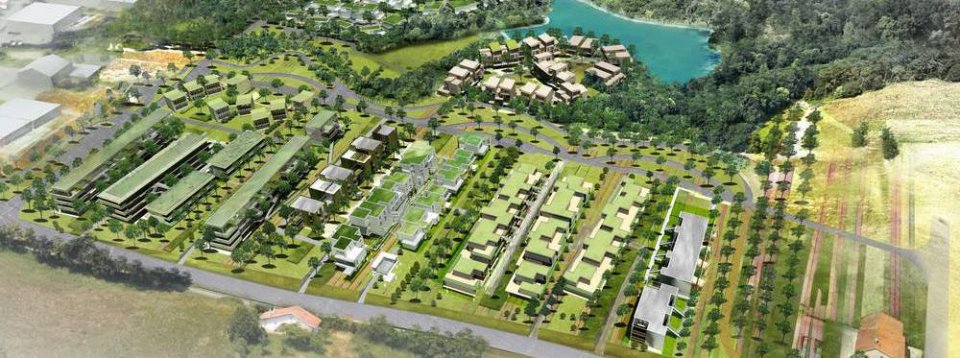
Scale of the project: neighbourhood
Urban density in which the NbS is implemented: low (suburb at the limit with
rural areas, etc.)
- Construction of an eco-district with ecological networks and biodiversity as starting point
Design and construction of an eco-district with the ecological networks and biodiversity as starting point. The implementation of this project is based on environmental approach to urban planning. The district is an environmentally-friendly project and favors collective housing to preserve green areas.
This NbS is also combined with other environmental friendly solutions: Bio-sourced materials - Renewable energy system (solar panels, etc.).
- More energy efficient buildings
- Reduction of energy in the production of new buildings and building materials
- Restoring ecosystems and their functions
- Improve connectivity and functionality of green and blue infrastructures
- Increase achievements of biodiversity targets
- Increase Biodiversity
- Increase quality and quantity of green and blue infrastructures
- Increased cultural richness and biodiversity
- Enhancing sustainable urbanisation
Process enablers:
Knowledge drivers → Generation of evidence
Process inhibitors:
no data
Expected time for the NbS to become fully effective after its implementation: short (immediately to few months)
feedback: still well adapted
Expected life time of the intervention: more than 30
Dates (for project delivered): 2012
Global (estimated) cost of the project: more than 5M€
Financing mechanism: cluster1 public financing
BUSINESS MODEL:
Business cluster: Organizational
Business model: Develop scale-up solutions
Business cluster: Social
Business model: Adopt a stewardship role
This project combines biodiversity protection at large scale by taking into account ecological networks and inhabitants well being. It also has a positive environmental impacts by using renewable energies.
- Strategies actions
- Urban planning strategies
- Ensure continuity with ecological network
- Object shapes
- On the Ground
- Parks and gardens
- urban green spaces with specific uses (school playgrounds
Alice Duquesnoy (alice.duquesnoy-mitjavila@plante-et-cite.fr)
Olivier Damas
Plante & Cité (https://www.plante-et-cite.fr/)
Maison du Végétal,
26 Rue Jean Dixmeras, 49000 Angers
Further information
Nature4Cities (https://www.nature4cities.eu/) aims to develop a knowledge diffusion around Nature-Based Solution (NbS) and a decision support platform through new collaborative models.
This project is part of the Nature4Cities's pioneer case studies database, it will feed the observatory, NbS pre-selection and replication tools, gathered into the Geocluster4NBS.
This project was chosen as a pioneer case study for the following reasons: the project take into account ecological continuity in its design. It allows to create cohabitation between inhabitants and local biodiversity.
Nature4Cities project has received funding from the European Union’s Horizon 2020 research and innovation program under grant agreement No 730468.


